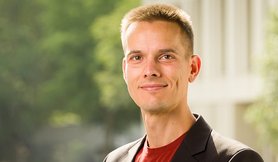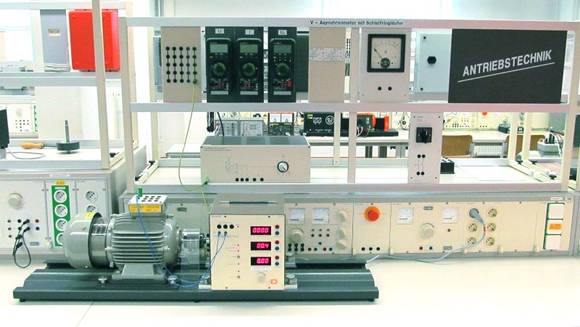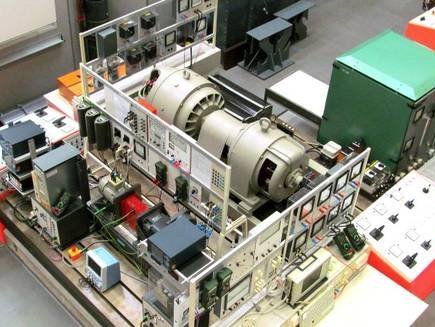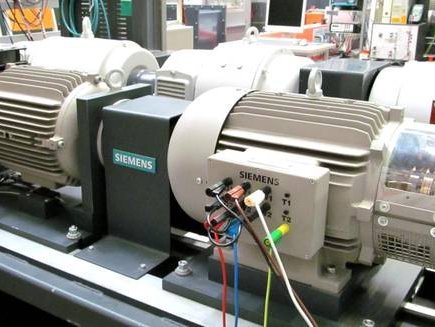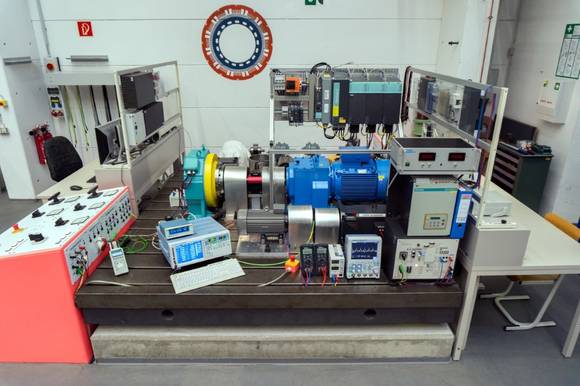Electrical machines and drives
Room: L 127, L 102
Phone: +49 351 462-3550
Phone: +49 351 462-2438
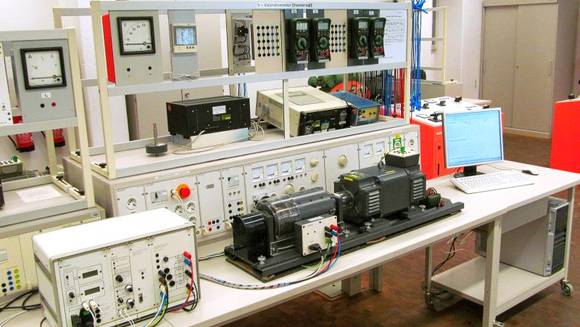
Laboratory Electrical Machines I (L127)
In the laboratory "Electrical Machines I", students are given the basic knowledge of the different types of electrical machines in the form of practical training.
At the test bench, students of the degree courses electrical engineering and information technology, general mechanical engineering/vehicle technology and industrial engineering learn about the stationary operating behaviour of the most important electrical machines.
During these practical exercises, special emphasis is placed on reading circuit diagrams, self-reliant circuit arrangement, becoming familiar with measuring methods and devices for electrical and mechanical quantities, and consistent compliance with safety regulations.
The evaluation of the measured values, the graphic representation of the functional relationships and a curve discussion is computer-aided in the form of protocols. In this way, students also acquire skills in the presentation of technical and scientific results.
In accordance with the training objective, the test bench are didactically specially prepared facilities in the power range of approx. 1 kW. The test items are standard machines from the industrial program of well-known electrical machine manufacturers, which are loaded with controlled magnetic particle brakes or DC pendulum machines.
| Test bench | Goal | Performance |
|---|---|---|
| Externally excited DC motor, three-phase asynchronous motor with slip-ring rotor, frequency-controlled asynchronous machine, three-phase transformer, high-temperature superconductivity | Examination of the operating behaviour, measuring methods and instruments, computer-aided recording of measured values, display of characteristic curves and discussion of curves | approx. 1 kW |
Laboratory Electrical Machines II / Electrical Drives (L102)
The laboratory "Electrical Machines II / Electrical Drives" is used by students in the higher semesters who have already received basic training in the Electrical Machines I laboratory. It is also used for research projects.
Students of the degree courses electrical engineering and information technology and mechanical engineering are imparted practical knowledge about the stationary and transient operating behavior of the most important electrical machines such as converter-fed DC machines, converter-fed three-phase asynchronous machines and three-phase synchronous machines.
The main goal is to get to know modern measuring methods and devices for electrical and mechanical quantities as well as computer-aided measurement value acquisition and processing. The didactically prepared experiment stands with modern converters are in the power range over 2 kW.
Electric drives, i.e. the interaction of driven working machine, electric motor and actuator, including the control of these systems, are the content of the drive engineering practical training for students of the study field Electrical power engineering and drive technology.
The test bench each consist of a DC machine and a three-phase machine, which are coupled together. The machines are fed via SIMOREG power converters or SIMOVERT frequency converters and can be operated as motors or generators. The three-phase machines are standard asynchronous motors, asynchronous motors for main spindle drives in machine tools and servo motors.
The content of the practical exercises is to get to know the behaviour of these machines when fed by a power converter, the investigation of control structures including their optimisation as well as the investigation of special drive engineering questions. Highly dynamic torque measuring equipment and modern power and frequency measuring devices (power analyzers) are available for recording all relevant measured values.
The electric drives in the power range of approx. 5 kW consist exclusively of industrially used components. In addition to the practical training of students, they are also suitable for the implementation of research projects.
A powerful 16.7 Hz single-phase series-characteristic motor is used at the train engine test station, which is fed directly with this special frequency or via a rectifier. The operating behavior of AC and mixed current feed is examined.
Electrical drives
| Test bench | Goal | Performance |
|---|---|---|
| Converter-fed DC motor, converter-fed three-phase drive | Get to know the stationary and dynamic behavior current and converter fed drives using the example of device technology SIMOREG and SIMOVERT | approx. 5 kW |
| Dynamic operation of three-phase asynchronous machines | Coupling of drive systems via fieldbus | approx. 2 kW |
| Synchronous machine operation in isolated network/ parallel operation on a rigid network | Parameterization of the converter devices using the SIMOVIS software | approx. 3 kW |
Railway drive
| Test bench | Goal | Performance |
|---|---|---|
| Railway motor | Knowing the operating behaviour of a single-phase alternating current commutator motor with supply from a 16.7 Hz converter and with power converter supply | 6.8 kW |
Supervising professors and laboratory engineers
Prof. Dr.-Ing. Thomas Schuhmann
- Z 402B
- +49 351 462 2741

Prof. Dr.-Ing. Tobias Zaiczek
- Z 450A
- +49 351 462 2174

Dipl.-Ing. (FH) Martin Eckart
- Z 408
- +49 351 462 3525
